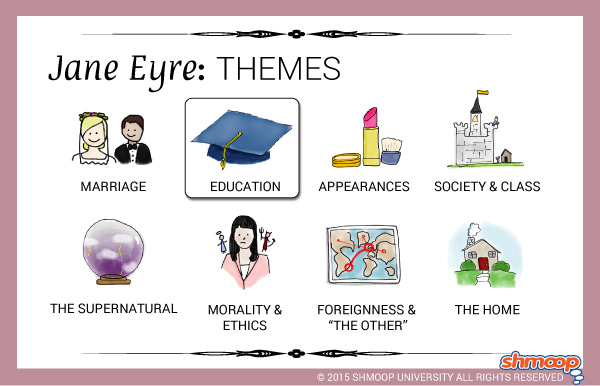 (Click the themes infographic to download.)
(Click the themes infographic to download.)
You won't ever find Jane Eyre chanting "We don't need no education." She not only needs it; she wants it.
In Jane Eyre, education provides the only route for someone who isn’t independently wealthy to improve their character and prospects—it allows social mobility. The "education" we’re talking about in this novel, however, is mostly aesthetic; characters learn basic music performance, basic artistic skills, and a little bit of foreign language. It’s enough to make them seem cultured, but not to make them actually useful for anything except teaching music, art, and foreign language. Education is also a safe haven, something that provides emotional satisfaction in a protected space separate from the hardships of the world.
Questions About Education
- Why does Jane want to go to school or learn anything in the first place? Why does education become such an important issue for her as a child?
- What does Jane’s formal education at Lowood prepare her to do?
- What does Jane's informal education at Lowood consist of, and what does it prepare her for?
- At what points in the novel does Jane value learning for its own sake, and why? At what points does she value learning for other reasons—and what are they?
- Does education replace something else in Jane’s life? If so, what?
- Jane makes her living as an educator—a teacher or a governess. Is there a sense in which Jane’s most important relationships—with Rochester, St. John, Mrs. Reed, and others—are all related to her profession somehow?
Chew on This
In Jane’s childhood, education takes the place of every single one of her emotional and physical needs—food, shelter, family, and friendship.
Because Jane initially learns to understand the world in terms of a teacher-student relationship, all her friendships have some master-pupil tinge to them.